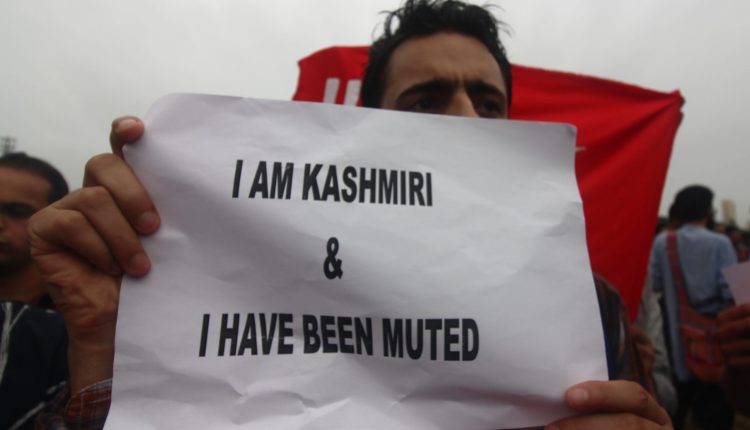By Mehr un Nisa
There comes a moment in every conflict when the war is no longer fought on land, but on truth. Indian occupied Jammu & Kashmir (IoJK) has now entered that moment. The raid on the Kashmir Times office on November 20, 2025, an office that had been shut since 2021, fits squarely into this pattern. It is part of a wider doctrine: to control the narrative by criminalizing the narrator.
International observers, from UN Special Procedures, also agree that IoK is no longer just a militarized zone, it is now an information frontier. In this space, journalism is treated as insurgency and truth-telling is viewed as sedition. This transformation is not accidental. It is strategic, systematic and deeply political. New Delhi seeks not only territorial control over IoK but discursive control and for that, journalism must be neutralized. This shift reflects a classic pattern in international relations where states facing internal crises of legitimacy turn to information control, narrative securitization and coercive legal frameworks to manufacture the appearance of stability.
What followed since 5 August 2019 is not only the region’s political disenfranchisement but also the systematic dismantling of its entire information ecosystem. In disputed territories, where international monitoring is already limited, dismantling the local press is equivalent to severing the world’s last line of sight. IoK today resembles other historically contested regions such as East Timor before independence, Northern Ireland during the Troubles and Xinjiang under securitization, where state power is preserved not only through military means but also by erasing independent documentation of abuses. The raids on media houses are part of a doctrine of epistemic repression, the deliberate suppression of knowledge production.
This environment of structural intimidation has converted IoK into a virtual information black hole. When journalists are unable to report, humanitarian agencies are unable to verify the information. When documentation is suppressed, accountability mechanisms collapse. This is why India has simultaneously barred international humanitarian access, including the ICRC since 2016 and UN/OIC missions since 2019. Denial of access is not an administrative lapse; it is an operational strategy to prevent independent scrutiny.
The FIRs against journalists allege a threat to sovereignty. India routinely deploys UAPA (anti-terror law), counter-intelligence detentions and digital surveillance systems to criminalise reporting on human rights, extrajudicial killings, disappearances, or security abuses. This violates international norms under ICCPR Article 19 (freedom of expression), UN Basic Principles on Freedom of Expression & OHCHR guidelines on the safety of journalists, however, India remains bound by these obligations even if it chooses to ignore them.
A functioning press ecosystem requires physical space, collective protections and institutional legitimacy. But the infrastructure of journalism has been dismantled. After the Kashmir Press Club was forcibly shut on 17 January 2022, journalists lost their only collective institutional protection. Numerous independent journalists have been denied press card renewals since 2019, which has prevented them from moving through checkpoints. Internet restrictions persist as deliberate policy: between 2019 and 2021, IoK endured the world’s longest shutdown and even today, 4G access is routinely throttled during operations. International travel is also restricted. Between 2019 and 2022, at least 22 journalists were placed on India’s “Look-Out Circular” list. In July 2022, Pulitzer Prize winner Sanna Irshad Mattoo was prevented from boarding a flight to France without justification. This is more than repression, it is structural demolition of the fourth estate.
The repression expanded further on 5 August 2025, when the Jammu and Kashmir Home Department banned 25 books on Kashmir’s politics and history, including critical works from A. G. Noorani, Victoria Schofield, Anuradha Bhasin and others. But the assault on journalism extends far beyond institutional raids. Since 2019, at least 20 journalists in IOK have been arrested for professional work. Freelance journalist Irfan Mehraj was detained in March 2023 on nine fabricated charges, including “terror financing.” The Kashmir Walla’s editor, Fahad Shah, arrested in 2022, spent nearly two years in detention. In May 2025, amid India-Pakistan clashes after the Pahalgam attack, independent journalist Hilal Mir was detained over a social media post. These detentions reflect the deliberate use of the UAPA, a counterterror law, to criminalize journalism. The pattern aligns with what human rights scholars refer to as legal authoritarianism, where law becomes a weapon of repression.
India’s strategy undermines its own claimed democratic legitimacy. No state confident in its governance raids shuttered newsrooms, criminalizes editors living abroad, or bans books by award-winning authors. No state committed to the rule of law cancels passports of journalists or equates reporting with terrorism. This behavior signals insecurity, not strength. It signals a state that seeks to control Iok not by consent or credibility, but by coercion and curated narratives.
The world must recognize that IoK’s information blackout is not a domestic matter; it is a crisis of international oversight, legal obligations and human rights protection. As long as journalists in IoK remain targets, the valley will remain not only a political dispute but a moral indictment of the global community’s silence.
The author is the head of the research and human rights department of Kashmir Institute of International Relations (KIIR). She can be contacted at the following email address: mehr_dua@yahoo.com, X @MHHRsays

